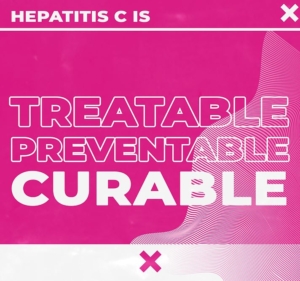
Hepatitis C is a blood-borne viral infection that affects the liver. It causes the liver to become inflamed and damaged and not work as effectively.
Many people who have hepatitis C have no symptoms.
You can get hepatitis C from blood to blood contact with someone who has hepatitis C.
Hepatitis C can be transmitted through:
- Using/sharing drug injecting equipment and using/sharing drug snorting/smoking equipment. The highest rate of transmission of hepatitis C in Ireland and worldwide is through the sharing of drug injecting equipment.
- Vaginal, anal and oral sex without a condom. The risk of acquiring hepatitis C through sex is low, but can happen if blood is present such as menstrual blood or during anal sex. Blood is more likely to be present if sex is rougher, goes on for a long time, and if sex toys are being used. The risk of acquiring hepatitis C increases if you are living with HIV. Gay, bisexual and men who have sex with men appear to be at a greater risk.
- Other blood to blood contact, such as sharing toothbrushes, razors and scissors; getting tattoos, body piercings and other cosmetic procedures; needlestick injury.
- Vertical transmission during childbirth (rare). Breastfeeding is fine if nipples are not cracked.
The only way to find out if you have hepatitis C is to get tested. The two tests needed are available at your local drug treatment clinic, GP practice, hospital or sexual health clinic.
There is a CURE for hepatitis C. Current treatment is extremely effective and consists of an 8 to 12 week course of anti-viral tablets (some people need a 24 week course). Treatment is FREE and cure rates are approaching 95%.
There is no vaccine to prevent hepatitis C and even after successful treatment, you can get hepatitis C again. Hepatitis C can be prevented by:
- Safer drug using practices: use sterile drug using equipment.
- When sexually active, always use condoms and/or dental dams for vaginal, anal and oral sex and for rimming; don’t share sex toys – use condoms on the sex toy and thoroughly clean the toy before using it again; and cover fingers or hands for anal or vaginal penetration – latex gloves or finger cots.
- Do not share personal grooming items e.g. razors, tweezers, toothbrushes.
- Use standard, universal precautions when cleaning up spillages of human blood and body fluids, and in situations where needles and other skin piercing equipment are used to avoid needle stick injuries.
- If getting tattoos, body piercings, acupuncture, cosmetic injections etc. ensure that the equipment used is sterilised.
- Get tested and treated if required.
There is support available including a peer support programme. Contact the Hepatitis C Partnership or the Saol Project.
Get more information about Hepatitis C at www.hse.ie/hepc and www.hepcpartnership.ie.
